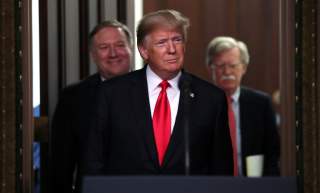Trump's Hired Hands Want a War in Iran
Donald Trump must take control of U.S. policy on Iran instead of leaving it in the hands of those who have been promoting unending confrontation with Tehran for their entire careers.
Are we headed for a war with Iran?
This question has been bandied about periodically throughout the last forty years of hostile relations between the United States and Iran. There was a time not too long ago when the Obama administration was seriously considering the use of military force against Iran’s nuclear program. Fortunately, the war talk dissipated after U.S. diplomats arrived at the conclusion that talking things through was a far more constructive way to resolve the nuclear issue than loading up the B-52’s.
U.S.-Iran relations are approaching a dangerous inflection point. If President Donald Trump doesn’t wisen up and start putting out genuine feelers to Tehran for some kind of communication—feelers that are more serious than his off-the-cuff “call me” remarks at the White House—a situation that is now tense could escalate into a shooting war, which nobody wants except for the most committed administration hardliners.
The relationship between Washington and Tehran in general has seldom escaped its perennially horrendous state, but recent events of the last month have poisoned the well considerably. Through its actions, the Trump administration has made it clear to the Iranians that they are in no mood to negotiate.
The Islamic Revolutionary Guard Corps has been designated as a foreign terrorist organization, the first time in U.S. history that an arm of a nation’s military has been referred to in similar language as Hezbollah, Hamas, Al Qaeda, and all the rest. Washington is no longer allowing other countries to import Iranian crude oil without being sanctioned, a decision which will take hundreds of thousands of additional Iranian barrels off the market. Last week, the White House sanctioned Tehran’s raw metals industry, an action that will force foreign traders to shy away from the Iranian market if it seeks to continue doing business in the United States. The Trump administration’s maximum pressure campaign against Iran is obvious in its intentions—bleed the Iranian economy dry and force Tehran to sue for a settlement on America’s terms.
All of these sanctions take place as Washington is building up military hardware in and around the Persian Gulf to intimidate Iran from lashing out. As of this writing, B-52H Stratofortress bombers, F-15’s, and F-35A’s are engaging in what the U.S. military calls “deterrence flights” in the region. The same day American aircraft were circling the waters of the Persian Gulf. Trump was at the White House warning Iran not to play any games. “If they [Iran] do anything, it will be a very bad mistake,” Trump told reporters.
Iran, however, is highly unlikely to back down in the face of demands and ultimatums from Washington—particularly from an administration it views as inherently adversarial and interested in nothing short of the Islamic Republic’s full, complete, and unconditional surrender. As Ali Vaez of the International Crisis Group wrote in a May 12 article in the Atlantic, “The one thing Tehran would find more intolerable than the crushing impact of sanctions is raising the white flag because of them.” The Islamic Republic has weathered stormer seas in its young history and came out the other side fully intact. The White House is in many ways pushing on a closed door.
For Trump’s hawkish advisers—National Security Adviser John Bolton and Secretary of State Mike Pompeo—instigating or provoking a conflict with Iran would serve their unified purpose of throwing the ayatollahs out of the corridors of power for good. Yet for Trump himself, rightly skeptical of launching dubious wars of choice and having committed to the American people he would extricate the United States from pointless interventions, picking a fight with Iran would be a direct violation of his campaign promise. More important, a military conflict with Iran would be a U.S. response wholly disproportionate to the threat Iran poses to U.S. security.
Washington is full of advisers, think tank scholars, and pundits who believe that it’s simply impossible for the United States and Iran to coexist and that the only solution to the Iranian problem is to change the regime—whether by force or by collapsing Tehran’s finances and instigating a widespread, domestic revolt. But to suggest that the United States, the world’s only superpower with global power projection capabilities, is incapable or powerless to manage Iran is a severely flawed interpretation of the overall situation. Indeed, it underestimates the superior power of the United States and gives Tehran far too much credit than it’s entitled to.
Right now, diplomacy between Washington and Tehran is unlikely over the short-term. The Iranians will likely bide their time and hope U.S. policy will change after the 2020 U.S. presidential election.
However, what the Trump administration can do is decrease the tension before the situation gets to a point where avenues for de-escalation are further constrained. Trump must take control of the policy instead of leaving it in the hands of those who have been promoting unending confrontation with Iran for their entire careers. The simplest way to do this is by establishing direct lines of communication between U.S. and Iranian officials to—at the very least—pave the road for a dialogue and create a node that can be used by both to address any misunderstandings that occur at a moment's notice.
The American people don’t want a war. The Iranian people don’t want a war. Trump doesn’t want a war. And the Iranian government, increasingly constrained by U.S. secondary sanctions, doesn’t want a war it would lose. It’s not too late for the president to nip the worst-case scenario in the bud.
Dan DePetris is a Fellow at Defense Priorities as well as a columnist for the Washington Examiner and the American Conservative. You can follow him on Twitter at @DanDePetris.
Image: Reuters

